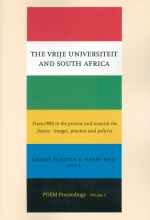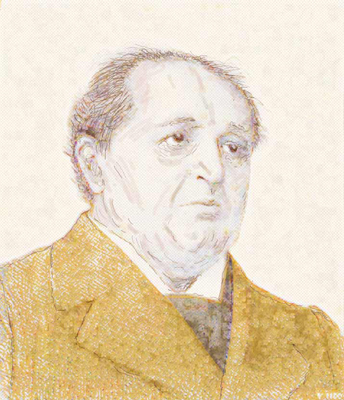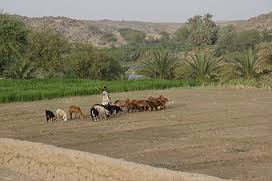Abraham Kuyper and his South African Brethren
A smile of satisfaction must have appeared on Abraham Kuyper’s broad face while reading the letter that he had just received. It came from distant South Africa, and communicated congratulations from the governors of the Paarl Gymnasium on the opening of the Vrije Universiteit three months previously.
‘Devoted as we are to pure Reformed doctrine’, wrote chairman S.J. du Toit, ‘even at this southern outpost of the world, it gives us reason to glorify God’s holy name for placing this doctrine on the lamp stand through your work’.
Pious and hearty words, to which Kuyper could not but say ‘amen’. Besides, S.J. du Toit was not just anybody. Despite his youthfulness – he was not yet 34 years old, ten years younger than Kuyper himself – he was an extremely influential man in South Africa: he was a clergyman and author, founder of the Genootskap van Regte Afrikaners (1875), editor in chief of Di Patriot (1876) and founder of the Afrikaner Bond (1879). Everything pointed to the Afrikaners taking the lead in South Africa in the course of the following years, under the powerful leadership of this front man for the population of Hollandsch-Afrikanen at the Cape Colony. Moreover, Du Toit was Reformed, an opponent to liberalism in the NGK and in society in general, and an advocate for Christian schooling. In the letter of congratulation from Du Toit, therefore, Kuyper could read a declaration of support from a brother, a kindred spirit and an ally. Read more
POEM: Political Studies In South Africa. A Personal Perspective.
 2005. First, let us consider the discipline’s demography in South Africa. Over the last ten years political studies or political science has been taught in each of the country’s 21 universities. Aspects of the discipline were also taught in public administration courses at polytechnics; several of these institutions are now being amalgamated with universities. Historically, as with other areas of social science, politics as an academic community was sharply divided, socially and intellectually between the English language universities and the Afrikaans medium institutions. Within Afrikaner departments, traditionally, the discipline was influenced quite heavily by American behaviouralist and quantitative social science models and methods and researchers tended to focus their work within the confines of the formal political system (including the structures of ethnic homeland government). At the segregated black universities, departments were often led and staffed by graduates from Afrikaans institutions as well as from UNISA.
2005. First, let us consider the discipline’s demography in South Africa. Over the last ten years political studies or political science has been taught in each of the country’s 21 universities. Aspects of the discipline were also taught in public administration courses at polytechnics; several of these institutions are now being amalgamated with universities. Historically, as with other areas of social science, politics as an academic community was sharply divided, socially and intellectually between the English language universities and the Afrikaans medium institutions. Within Afrikaner departments, traditionally, the discipline was influenced quite heavily by American behaviouralist and quantitative social science models and methods and researchers tended to focus their work within the confines of the formal political system (including the structures of ethnic homeland government). At the segregated black universities, departments were often led and staffed by graduates from Afrikaans institutions as well as from UNISA.
In English speaking departments, by the 1980s, Marxist approaches had supplanted traditionally liberal ideas about politics and leading researchers concentrated their attention on popular political movements, emphasising those dimensions of their activities and ideas that corresponded most closely with expressions of class consciousness. In this context, the study of the discipline had a strong historical dimension: indeed at institutions such as Wits and Cape Town the boundaries between a ‘revisionist’ history grounded in Marxist conceptions of political economy and the discipline of politics became very blurred indeed. Today, though legacies of these differences between Afrikaans and ‘English’ institutions remain, the distinctions between Afrikaans-speakers and English language practitioners of the discipline in South African are less important, particularly since the introduction of English language courses at Afrikaans universities. Read more
Land And Agrarian Reform In South Africa: Caught By Continuities – DPRN Six
Introduction
Land and agrarian reform is often implemented with a view to breaking with the past, particularly by transforming ownership of land and its uneven distribution. The post 1994 land and agrarian reform in South Africa began with a similar agenda. In fact land reform was launched and implemented even before Apartheid was dissolved and the new ANC-led government took control. The Apartheid government under F.W. De Klerk initiated some kind of limited land reform during the period from 1990 to 1993.
In March 1991, De Klerk’s government repealed the 1913 and 1936 Land Acts. In November of the same year it appointed an Advisory Committee on Land Allocation (later renamed as the Commission on Land Allocation). The Commission made recommendations on state land disposal and the restoration of land to those disposed of formal land rights. This happened first in Natal, where dispossessed communities in Richards Bay (van Leynseele and Hebinck, 2008), Roosboom, Charlestown and Alcockspruit got their land rights formally restored in the years 1992-93 through this process (Walker 2004). The strengths and weaknesses of the pre-1994 land reforms were replicated post-1994 in the form of a lack of ‘coherent state procedures and institutional inadequacies’ to manage the land reform process (Walker 2004; 2005).
This paper explores the institutional dynamics by pursuing the argument that contemporary land reform policy and practices are characterised by continuities, rather than by discontinuities. Given the radical policy discourse of Reconstruction and Development, political and economic transformation, one may expect more discontinuities to occur than continuities. The shift from the early emphasis on human rights to paternalism and ‘productionism’ (from LRAD to SLAG) is testimony of what we would brand as continuities. The assumption of our investigation is that during Apartheid land use on white-owned farms was production and market oriented. Discontinuities no doubt occur; towards the end of the paper we will provide a few examples that show that land once designated for white ownership and ‘commercial agriculture’ is now being redeveloped into land owned by black people who by and large use the land – quoting an informant one of us spoke to in November 2007 in the Eastern Cape – ‘the African way’.[i]
The organising notion of continuity (and discontinuity) is useful for an analysis of changes over time. Continuity refers to the state of uninterrupted flow or coherence, or the property of a continuous and connected period of time (Oxford English Dictionary). Synonyms are persistence, enduringness, durability, lastingness, strength or permanence by virtue of the power to resist stress or force. The continuities that will be explored in this paper relate to the agricultural expert system that has gradually evolved in South Africa and which plays a prominent role in the design of land reform. The persistence of continuities would then indicate the extent to which dramatic transformations of the institutional infrastructure in agriculture have occurred. Historical analysis allows us to underline the continuity of prescriptions and modes of ordering in the past and present. Distinctions between the pre-apartheid, apartheid and post-apartheid periods belie the existence of important continuities.
The setting is the Eastern Cape Province, notably the regions formerly known as Ciskei and Transkei. The case material to underline the argument of continuity rather than discontinuity are entrenched in the prescriptive policies of the state with regard to land use as well as in the multiple responses of land users. Such policies are largely informed by agricultural expert opinions with regard to land use such that they have helped to create and order South Africa’s agrarian landscapes. The Glen Grey Act of 1894 evolved into Betterment Planning practices dictating and attempting to change land use patterns. Current land reform policies aim to prescribe similarly land use by paternalistically fixing land reform subsidies to forms of land use that fit into the category of ‘commercial agriculture’. Like James (2007), we intend to pursue the provoking argument that the current Department of Land Affairs (DLA) and National and Provincial Departments of Agriculture are rather similar to their Apartheid era predecessors, the Department of Native Affairs and the Native Agricultural and Lands Branch. Read more
ISSA Proceedings 2010 – Preface
 The Seventh Conference of the International Society for the Study of Argumentation (ISSA), held in Amsterdam from 29 June to 2 July 2010, drew again more submissions for presentations than any ISSA Conference before. After a strict selection procedure, exactly 300 scholars were invited to present their papers at the Conference. In addition, the Conference attracted some 200 interested colleagues and students who just wanted to attend the presentations and take part in the discussions. All in all, 500 people interested in argumentation assembled in Amsterdam to present papers and exchange views.
The Seventh Conference of the International Society for the Study of Argumentation (ISSA), held in Amsterdam from 29 June to 2 July 2010, drew again more submissions for presentations than any ISSA Conference before. After a strict selection procedure, exactly 300 scholars were invited to present their papers at the Conference. In addition, the Conference attracted some 200 interested colleagues and students who just wanted to attend the presentations and take part in the discussions. All in all, 500 people interested in argumentation assembled in Amsterdam to present papers and exchange views.
The 2010 ISSA Conference was, like previous ones, an international meeting place for argumentation scholars from a great variety of academic backgrounds and traditions, representing a wide range of academic disciplines and approaches: (speech) communication, logic (formal and informal), rhetoric (classical and modern), philosophy, linguistics, discourse analysis, pragmatics, law, political science, psychology, education, religious studies, and artificial intelligence. Besides papers on argument schemes, classical argumentation theory, critical responses to argumentation, deep disagreement, ethos and pathos, fallacies, the history of argumentation theory, interpersonal argumentation, logic and reason, practical argumentation, premise acceptability, rationality and reasonableness, topoi, the Toulmin model, visual argumentation, and argumentation in a cross-cultural perspective, papers were presented on argumentation in controversy, debate, education, science and the media, on argumentation in a financial, historical, legal, literary, medical, political and religious context, and on argumentation and computation, definition, epistemology, ethics, linguistics, persuasion, political philosophy, pragmatics, social psychology, stylistics, and the Internet. In the opinion of the editors, the Proceedings of the Seventh ISSA Conference reflect the current richness of the discipline. Read more
ISSA Proceedings 2010 – “War With Words”: I.A. Richards’ Attack On Argument
 In The Philosophy of Rhetoric (1936) I. A. Richards proposed to revive “an old subject” that had “sunk so low” that it perhaps should be simply dismissed to “limbo” (Richards 1936/1965, p. 3). In Richards’ view rhetoric’s sorry condition was a result of the flaws of the “old rhetoric” which he says began with Aristotle and ended with Richard Whately in the nineteenth century (Richards 1936/1965, p. 4). The “old rhetoric” was “an offspring of dispute” that “developed as the rationale of pleadings and persuadings; it was the theory of the battle of words and has always been itself dominated by the combative impulse” (Richards 1936/1965, p. 24). Whately’s Elements of Rhetoric (1828) represents the inadequacies of the old rhetoric because it offers nothing more than a “collection of prudential Rules about the best sorts of things to say in various argumentative situations” (Richards 1936/1965, p. 8).
In The Philosophy of Rhetoric (1936) I. A. Richards proposed to revive “an old subject” that had “sunk so low” that it perhaps should be simply dismissed to “limbo” (Richards 1936/1965, p. 3). In Richards’ view rhetoric’s sorry condition was a result of the flaws of the “old rhetoric” which he says began with Aristotle and ended with Richard Whately in the nineteenth century (Richards 1936/1965, p. 4). The “old rhetoric” was “an offspring of dispute” that “developed as the rationale of pleadings and persuadings; it was the theory of the battle of words and has always been itself dominated by the combative impulse” (Richards 1936/1965, p. 24). Whately’s Elements of Rhetoric (1828) represents the inadequacies of the old rhetoric because it offers nothing more than a “collection of prudential Rules about the best sorts of things to say in various argumentative situations” (Richards 1936/1965, p. 8).
Richards’ rejection of traditional rhetoric and his promise to revive the subject made The Philosophy of Rhetoric one of the foundational documents of the “New Rhetoric” of the twentieth century. Thus it is important to examine the assumptions of Richards’ indictment of rhetoric and consider if he is correct that it is no more than a “war with words” (Richards, 1955, p. 52). And even if Richards’ historical analysis is accurate, it does not necessarily follow that a disputational model must be abandoned if rhetoric is to prosper in our own times. Richards’ identification of argumentation as rhetoric’s chief disability has had significant implications for the direction of both rhetoric and argumentation. I will argue that Richards’ program to remove argument from rhetoric would, if followed fully, eviscerate rhetoric by stripping away stripping away much of the most fully developed and articulated aspects of rhetorical theory and practice. Moreover, Richards’ self-proclaimed “microscopic” view of rhetoric means that The Philosophy of Rhetoric has little to contribute to the development of rhetoric, or argumentation, in the twenty-first century. Read more
ISSA Proceedings 2010 – The Probable And The Problem
 1. Introductory remarks
1. Introductory remarks
1.1. Questioning the axiomatic principles is no more a contradiction in terms.
Modern philosophers of science, Albert Einstein among them, established the relative status of foundational propositions of any paradigm. In spite of paradigmatic relativity, axiomatic principles do not lose their constitutive role[i].
The progressive axiomatization of sciences and the constitution of theoretical paradigms in many fields of research entitle us to adopt this method for the analysis of doxa – the domain we are interested in. “Doxa, though it is the general word for ‘belief’, tends to carry with it the hidden, but sometimes operative implication, that the belief in question is an assessment of something”, says Crombie (1963, pp. 33-34).
1.2. The intention of speaking about paradigmatic structure of doxa was explicitly manifested by Gianni Vattimo (1993, pp. 90-108)[ii] and probably by many other philosophers. Consequently, it is not necessary to supply more proofs in supporting our theoretical position. It is important to emphasize that, from our point of view, the paradigmatic analysis of doxa is rather a method than a theory, part of the interlocutors’ critical device. The formal criteria of a theoretical paradigm – coherence, concision, and exhaustiveness, as expressed by Thomas Kuhn (1976), represent the points where the cooperative and rational principles of doxastic argumentation can be critically examined, intuitively by interlocutors, explicitly by theoreticians.
Being an “assessment of something”, doxa is dominated by axiology.
We define an axiological paradigm the multitude of empirically axiological propositions (judgments of value, practical decisions, norms, orders, etc.) that can be reduced to a doxa concept. The basic meaning is crystallized in the form of a general definition which grounds the respective ensemble of propositions in a coherent, concise, and exhaustive way. Paradigmatic analysis of doxa refers to traditionally formulated doxastic categories. Read more




